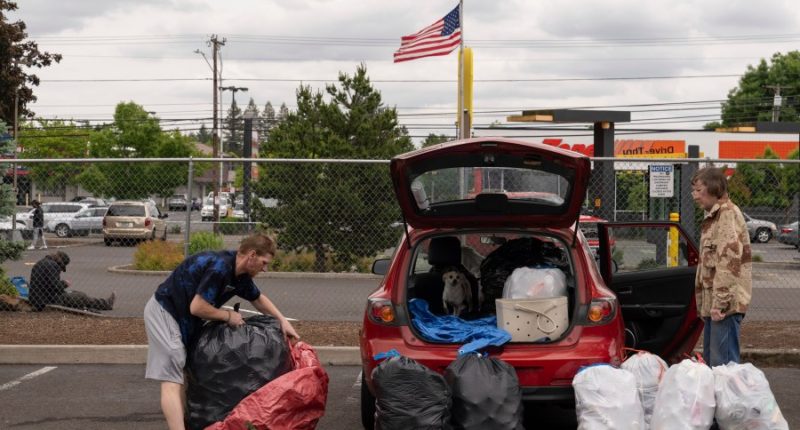Share this @internewscast.com

Monica Truax has been residing in her Portland home since 1992, in a neighborhood she described as a tight-knit community. However, issues began to arise after a bottle redemption center opened nearby a few years ago, leading to problems such as drug dealing, litter, and late-night disturbances.
“Everything has changed drastically,” she remarked. “Yet all the residents remain here, continuing to raise their families.”
Now, Oregon’s pioneering “bottle bill,” which has been adopted by nine other states, might undergo significant changes. Lawmakers are debating new restrictions on the operating hours of bottle redemption sites, as some claim these locations have become centers for drug activity and homelessness.
The trailblazing law to reduce littering by incentivizing recycling helped cement the state’s reputation as a leader in the emerging environmental movement. It has also become a financial security net for many, including those experiencing homelessness.
The legislation echoes calls to modernize the bottle bill, with some saying changes are needed to address unintended consequences.
“He did not envision this,” Truax said of former Oregon Gov. Tom McCall, who signed the bottle bill into law. “It’s just a mess.”
How does the bottle bill work?
Consumers originally paid a 5-cent deposit on each eligible bottle or can, then collected the deposit when they redeemed the empty container at a retailer, such as a supermarket or convenience store.
Over the years, the program has expanded accepted containers and increased the deposit to 10 cents. Twenty-seven centers exclusively for returns have been opened across the state.
California, Connecticut, Hawaii, Iowa, Maine, Massachusetts, Michigan, New York, Vermont and the U.S. territory of Guam followed Oregon in adopting the concept, according to the National Conference of State Legislatures.
In Oregon, people can sign up for accounts in which their refunds are deposited or choose cash redemptions. Some stores count containers by hand. Other sites have counting machines or areas where account holders can drop off bags of containers.
The deposit has not kept pace with inflation — 5 cents in 1971 would be equal to 40 cents today, according to the Consumer Price Index’s inflation calculator — but many low-income residents rely on it.
Why are critics upset?
Stores must accept container returns when they are open, and owners of all-night convenience stores, particularly in Portland, say they’re concerned about employee safety.
In an op-ed for The Oregonian/OregonLive last year, Jonathan Polonsky, president and CEO of the Plaid Pantry chain of convenience stores, wrote that fentanyl was selling for less than $1 a pill and “a small number of cans add up to enough to buy drugs.”
People redeeming containers at night “may be belligerent and intimidating, presenting a major safety risk to our store associates who have no choice under Oregon’s Bottle Bill to handle returns at that hour,” he wrote.
Truax, who lives with her husband in northeast Portland, said homeless encampments and people relieving themselves in public were among the many things she had witnessed on her block.
“I’ve seen it all,” she said, describing the scourge of fentanyl as “the cherry on the sundae.”
“It’s just sad,” she added.
Environmentally friendly income source
At the bottle redemption center near Truax’s home, Chris Grass waited with his father and girlfriend in the long line outside the door. They each redeemed the maximum amount of 350 containers per person per day for $105 in cash to help pay for gas and provide some extra money for things like cigarettes and coffee while he’s unemployed, he said.
“A lot of people don’t like people that go out and can,” he said. “But it’s actually good for the environment.”
In 2023, roughly 87% of eligible containers were returned for redemption, according to the Oregon Liquor and Cannabis Commission. That was the highest rate in the nation that year, according to the Oregon Beverage Recycling Cooperative, which operates the bottle bill program on behalf of its distributor members.
What would the legislation do?
The bill being considered by lawmakers would allow stores across the state to refuse container returns after 8 p.m.
In Portland, it would allow for “alternative” redemption sites, including possible mobile sites such as trucks that travel to different neighborhoods. Nonprofits would run the alternative sites for people who redeem containers every day, relieving the pressure on retailers, particularly downtown.
Stores in an area with an alternative drop site could limit or refuse hand-counted returns, with convenience stores specifically allowed to stop them at 6 p.m.
The proposal is supported by retailers as well as groups like the Ground Score Association, whose members include “canners” and waste pickers who collect containers for income. The association operates a Portland redemption center under a bridge called The People’s Depot that processes some 38,000 containers daily, according to its website.
It has pushed back against claims that the bottle bill fuels the fentanyl crisis and says most people redeeming bottles need the money to make ends meet.
“Since becoming manager of The People’s Depot, I’m learning how polarizing The Oregon Bottle Bill is,” the depot’s operational manager Kristofer Brown said in written testimony supporting the bill.
Do the proposed changes go far enough?
Unlike in some other states, Oregon’s bottle bill program is run by the private beverage industry rather than state government. The Oregon Beverage Recycling Cooperative retains unredeemed deposits, which topped $30 million in 2019, according to a 2020 state audit of the bottle bill.
The audit recommended several changes, including having some or all unredeemed deposits go to the state to help fund environmental programs.
Consolidated Oregon Indivisible Network, a progressive advocacy group, said in written testimony supporting the bill that “money is piling up in the bottle deposit fund” and called for another government audit.
The OBRC says unredeemed refunds go toward operating expenses for the beverage container redemption system.
The Legislature has until late June to approve the bill, which received overwhelming approval in the Senate and is now in the House.
















